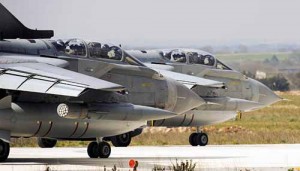NATO Watch calls on the NATO Secretary General to establish an independent inquiry to evaluate Operation Unified Protector in its entirety
Royal Air Force Tornado GR4 aircraft prepare to launch on a mission over Libya from Gioia del Colle air base in southern Italy [Picture: Senior Aircraftman Neil Chapman, Crown Copyright/MOD 2011
The Alliance secretary-general Anders Fogh Rasmussen speaking at a press conference the same day said, “This is serious business”. “It was serious business to take on the responsibility of this operation in Libya. It is also serious business to take the decision to terminate such an operation because we take full implementation of the United Nations’ mandate very seriously”, he added.
NATO Watch agrees. Such a ‘serious business’ deserves a full, frank and independent evaluation of lessons learnt. In his press conference, for example, Rasmussen claimed that “Our military forces prevented a massacre and saved countless lives”. This may well be true, but where is the evidence? Indeed, what would count as evidence?
NATO Watch director, Dr Ian Davis said, “NATO‘s midwifery of Libya‘s liberation from dictatorship raised many complex issues before and during the intervention. Before formally closing the operation, NATO needs to identify and articulate the hard lessons of the intervention with candour and objectivity”.
There is no shortage of questions for a Libyan inquiry to consider. For example:
- What motivated the campaign and what was the impact of UN Security Council Resolution (UNSCR) 1973 and International Criminal Court (ICC) indictments against Gaddafi?
- Was there any way for the intervention to be calibrated to serve diplomacy between the insurgents and Gaddafi, or were the goals really aimed at regime change? And now that regime change has taken place, what are the social and political consequences?
- What are the ramifications of the fact that Gaddafi had given up his weapons of mass destruction in exchange for regime recognition, but was nevertheless confronted with regime change? How, for example, will NATO’s intervention in Libya be perceived by Iran and other would be nuclear powers?
- How might the techniques to lessen civilian casualties in Libya be applied in other theatres and how could NATO improve its investigation and monitoring of alleged civilian casualties?
- Now that the operation is almost over, how will NATO protect civilians in the post-conflict Libya given reports of widespread reprisals and prisoner abuse?
- How many people (not just civilians) did NATO operations kill? (Ministry of Defence data describes innumerable attacks on diverse targets but never with any figures for killed and injured even though bomb damage assessment using drones etc, would have provided copious information. And if there were many deaths due to the actions of NATO, this could be a source of bitterness and radicalisation in the future).
- How much did the intervention cost? And who paid for it?
- What were the details of Special Forces involvement and how do these square with “no troops on the ground” as per UNSCR 1973?
- What was done to prevent the haemorrhaging and proliferation of weapons from Libyan arms stockpiles?
- How useful a template is Libya for future Responsibility to Protect (R2P) missions? Has the mission provided any deterrent effect?
- What are the main lessons for NATO from the Libya campaign in terms of future force development strategies and the ongoing Defence and Deterrence Posture Review (DDPR)?
“R2P has now assumed a prominent place among NATO’s new missions” Davis added. “The Alliance needs to develop coherent approaches to the preparation, implementation and operational aspects of such actions”.
Lessons will only truly be learned when NATO incorporates them into its planning, doctrine, tactics, and training—a process which can take some time. Therefore, NATO should also consider establishing an R2P Committee, not only to incorporate lessons learned from Operation Unified Protector, but to analyse potential future threats of genocide and mass atrocities; develop military guidance on genocide prevention and response; and incorporate guidelines into Alliance doctrine and training (through, for example, a genocide prevention standardization agreement).
“Libya was a mission that occurred under unique circumstances”, noted Davis. “Future NATO operations under different circumstances will likely produce different results. Common sense suggests that the lessons offered here should be balanced against changing mission requirements and conditions. Future missions, however, are likely to contain enough parallels that the lessons learned in Libya warrant close attention”.
